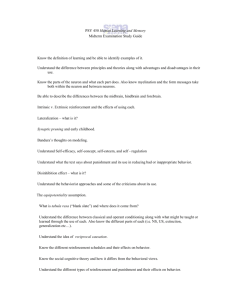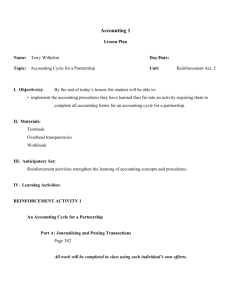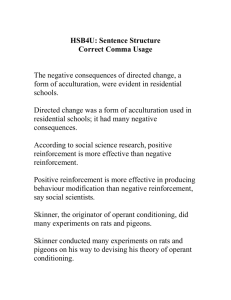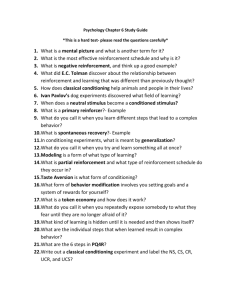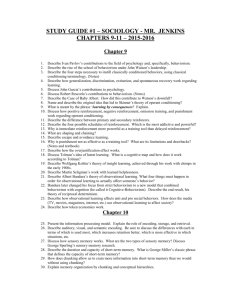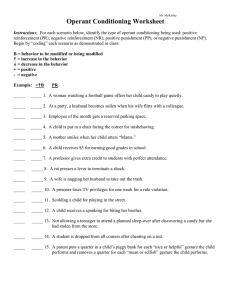Behaviorism - edci4322su2011
advertisement
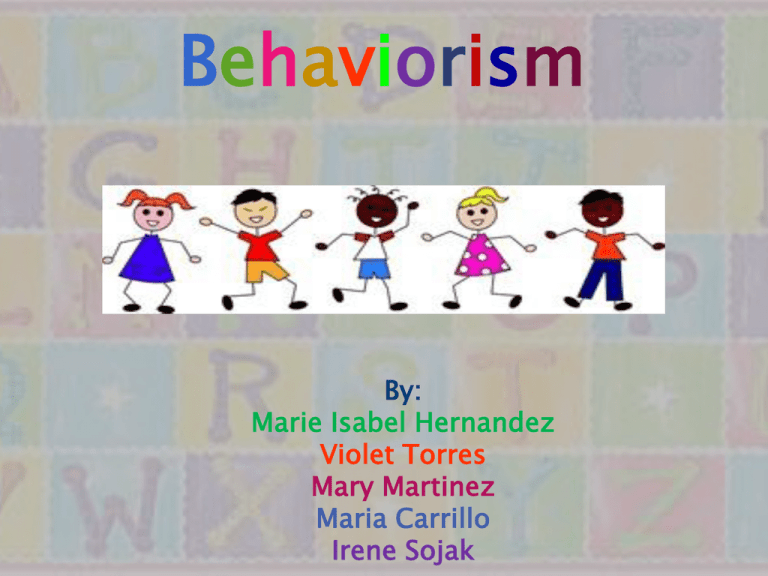
Behaviorism By: Marie Isabel Hernandez Violet Torres Mary Martinez Maria Carrillo Irene Sojak What is Behaviorism? • A theory of learning based on the idea that behaviors are acquired through conditioning. The conditioning occurs through the interaction with the environment. http://psychology.about.com/od/behavioralpsychology/f/behaviorism.htm?p=1 Behavioral Learning Theory • B.F. Skinner (1904-1990) • Operant Conditioning • Conditions and Consequences Classroom Observation • Learning Club Preschool (daycare) • Age range from 1 ½ - 6 years old • Number of Students: 13 in the toddler group and 5 in the young children group • Student demographics • Length of Observation: 40 minutes Classroom Findings • Instructor: Teacher Roxanne • Instruction • Students • Teacher-student interaction • Student-student interaction • Class management • Assessment • Curriculum Relevance of the Theory • Observation = Behavioral Learning Theory Positive Reinforcement •Verbal praise •High-five •Chance to go to a station Negative Reinforcement •Teacher completing part of assignment •No assignment required Punishment •Teacher took away scissors •Students had to pick up their mess Argument for Behaviorism We agree with B.F. Skinner’s theory that many of the voluntary responses of animals and humans are strengthened when they are reinforced and weakened when they are either ignored or punished. • • • • Positive Reinforcement Negative Reinforcement Punishment We believe to a certain extent and limit. Reinforcement and Punishment Comparison REINFORCEMENT (Behavior Increases) PUNISHMENT (Behavior Decreases) Positive +(Something is added) Positive Reinforcement Positive Punishment Negative – (Something is removed) Negative Reinforcement Negative Punishment Is to add a reinforcer that results in increasing the behavior. Ex. Mother gives her son candy for cleaning up his toys. Is to remove an aversive stimulus(neg. reinforcer) that results increasing the behavior. Ex. A group of students are working at their desks after the teacher has stated that they will not be required to do homework assignments that weekend if their classroom assignments are completed before the end of the day. Decreasing (weakening) a target behavior by adding an aversive stimulus after the behavior occurs. Ex. Student is sent to the office for hitting a classmate. Removal of something that results in reduction of the behavior. Ex. Make student miss computer time for yelling at the teacher. http://projects.coe.uga.edu/epltt/index.php?title=Behaviorism Practical/Pedagogical Implication • Using Positive Reinforcement is helpful in the classroom. • Students liked to be praised while they were working on the activity. • By giving Positive Reinforcement helps the child to be disciplined. Summary Behaviorism Operant Conditioning Positive Reinforcement Negative Reinforcement Punishment Works Cited “Advantages and Disadvantages of using positive and negative reinforcement” 23 June 2011. http://www.google.com/search?sourceid=navclient&aq=0&oq=advantages+and+disadv antages+of+using+positive+and+neg&ie=UTF8&rlz=1T4ADRA_enUS436US436&q=adv antages+and+disadvantages+of+using+positive+and+negative+reinforcement+manag ement+essay Cherry, Kendra. What is Behaviorism? Web. 23 June 2011. http://psychology.about.com/od/behavioralpsychology/f/behaviorism.htm?p=1 “Consequences of Behavior”. 23 of June 2011. http://www.education.com/reference/article/consequences-behavior/ Dr. C. George Boeree. Personal Theories. Biography Web. 23 June 2011. <http://webspace.ship.edu/cgboer/skinner.html>. Dr. Christopher L. Heffner. Psychology 101 Chapter 4: Learning Theory and Behavioral Psychology. Web. 23 June 2011. Negative Reinforcement”. 24 June 2011. http://wik.ed.uiuc.edu/index.php/Negative_reinforcement Sadker, David and Karen R. Zittleman. Teachers, Schools, and Society. A Brief Introduction to Education. Boston: McGraw Hill Custom Publishing, 2007. Print. Snowman, Jack and Rick McCown. Psychology Applied to Teaching. United States: Wadsworth, 2012. Print. Standridge, Melissa. Emerging Perspectives on Learning, Teaching and Technology.”Behaviorism”. 24 June 2011. http://projects.coe.uga.edu/epltt/index.php?title=Behaviorism Any Questions?
